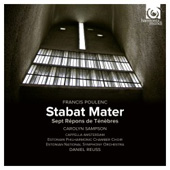
ESSENTIAL RECORDINGS

Despite the fact that French composer Francis Poulenc (1899-1963) was a prominent member of the group Les Six (Auric, Honegger, Milhaud, Tailleferre, Durey, and himself), was associated with Jean
Cocteau, and was highly respected in some artistic circles throughout his life, he never managed to gather the same number of followers that say Ravel or Satie ever did. A reason for that might have to do with his extremes
of style when setting music to paper. Some of his works would be right at home at the Moulin Rouge while others were definitely meant for the sanctuary of a church. He was once tagged by the French press as a
"half monk, half delinquent". Nevertheless, music of this calibre certainly deserves a greater audience and exposure than it has been granted in the past.
Following the death of one of his close friends, it seems that Francis Poulenc experienced a sort of religious epiphany which led him to compose more vocal works based on sacred texts. The Stabat Mater
and the Sept Répons de Ténèbres are two of his best efforts in the genre. Austere, and yet simple and earthy, but with moments that touch the sublime. Stravinsky had greatly impressed the
young Poulenc and it shows. Certain segments within these two works resemble a mix of Stravinsky's Symphony of Psalms and Carl Orff's Carmina Burana to a certain extent.
This new release on Harmonia Mundi had me dumbstruck right from the very beginning until the end. Reverance, sadness, joy, beauty, power, piety and exuberance are but some of the expressive
qualities the singers and musicians involved in this recording bring to the table. From the subdued and sombre opening bars of the Stabat Mater to the powerful outcries of Judas in the Sept Répons, every possible dynamic
and emotive nuance is exploited to its fullest. Conductor Daniel Reuss blends the orchestral and vocal forces so well, that rarely have I heard such a perfect balance between the two. And soprano
Carolyn Sampson is riveting. The way she softly slips into a note and then allows it to blossom is quite remarkable. And the power in her voice during the final segment of the Stabat Mater will pin you
to the wall. What can I say. If you already know and admire the music of Poulenc, you need to hear this recording. If you don't know this composer very well, this wonderful recording of some of his best work is a great way
to get acquainted with outstanding music.
Jean-Yves Duperron - April 2014